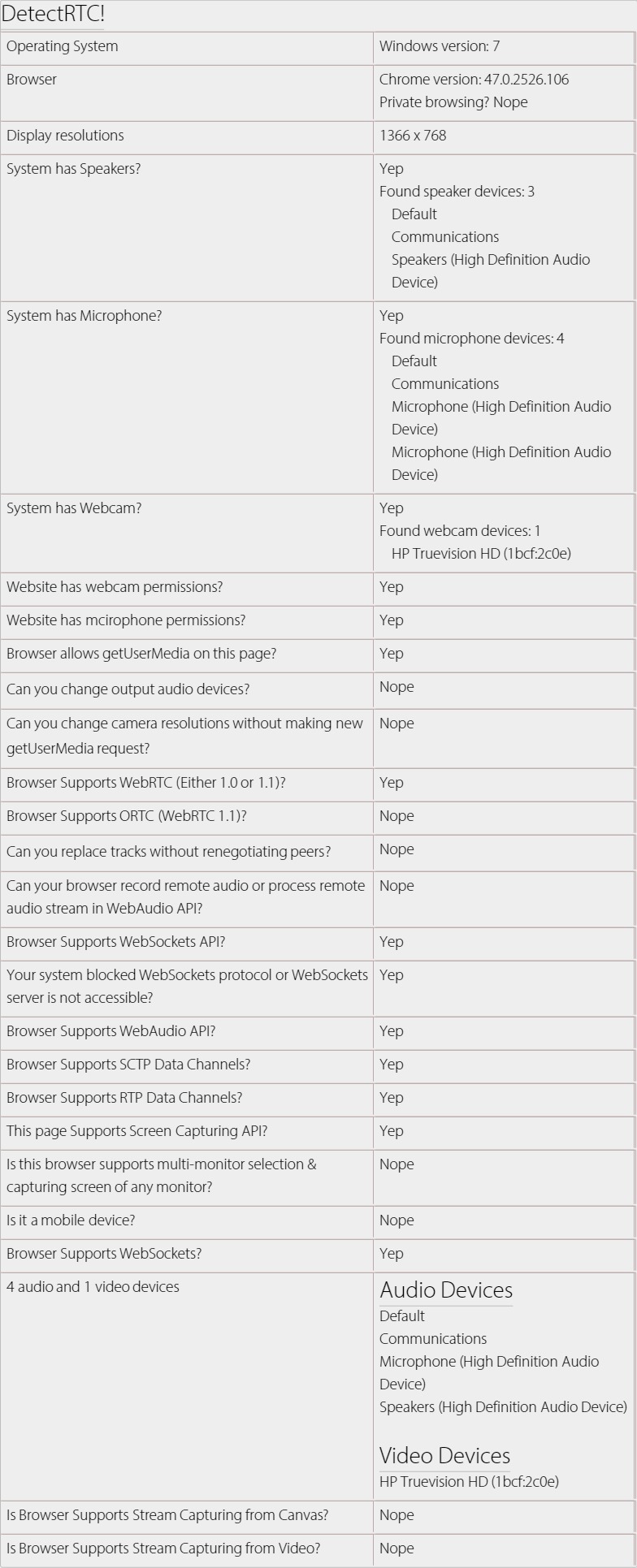Live Demo: https://www.webrtc-experiment.com/DetectRTC/
if (DetectRTC.isWebRTCSupported === false) {
alert('Please use Chrome or Firefox.');
}
if (DetectRTC.hasWebcam === false) {
alert('Please install an external webcam device.');
}
if (DetectRTC.hasMicrophone === false) {
alert('Please install an external microphone device.');
}
if (DetectRTC.hasSpeakers === false && (DetectRTC.broser.name === 'Chrome' || DetectRTC.broser.name === 'Edge')) {
alert('Oops, your system can not play audios.');
}A tiny JavaScript library that can be used to detect WebRTC features e.g. system having speakers, microphone or webcam, screen capturing is supported, number of audio/video devices etc.
It is MIT Licenced, which means that you can use it in any commercial/non-commercial product, free of cost.
npm install detectrtc --production
# or via "bower"
bower install detectrtc
DetectRTC.isSetSinkIdSupported // (implemented)
DetectRTC.isRTPSenderReplaceTracksSupported // (implemented)
DetectRTC.isORTCSupported // (implemented)
DetectRTC.isRemoteStreamProcessingSupported // (implemented)
DetectRTC.isWebsiteHasWebcamPermissions // (implemented)
DetectRTC.isWebsiteHasMicrophonePermissions // (implemented)
DetectRTC.audioInputDevices // (implemented)
DetectRTC.audioOutputDevices // (implemented)
DetectRTC.videoInputDevices // (implemented)
// Below API are NOT implemented yet
DetectRTC.browser.googSupportedFlags.googDAEEchoCancellation
DetecRTC.browser.googSupportedFlags.echoCancellation
DetectRTC.isMediaHintsSupportsNewSyntaxnode server.js
# or
npm start
# and open:
http://127.0.0.1:9001
# or
http://localhost:9001var DetectRTC = require('detectrtc');
console.log(DetectRTC.browser);
DetectRTC.load(function() {
console.log(DetectRTC);
});- Live NPM test: https://tonicdev.com/npm/detectrtc
Or try npm-test.js:
cd node_modules
cd detectrtc
# npm test
# or
node npm-test.js<script src="./node_modules/detectrtc/DetectRTC.js"></script>
<!-- or bower -->
<script src="./bower_components/detectrtc/DetectRTC.js"></script>
<!-- or CDN link (suggested) -->
<script src="https://cdn.webrtc-experiment.com/DetectRTC.js"></script>
<!-- or RawGit (if CDN fails) -->
<script src="https://cdn.rawgit.com/muaz-khan/DetectRTC/master/DetectRTC.js"></script>You can even link specific versions:
<script src="https://github.com/muaz-khan/DetectRTC/releases/download/1.3.5/DetectRTC.js"></script>// for node.js users
var DetectRTC = require('detectrtc');
// non-nodejs users can skip above line
// below code will work for all users
DetectRTC.load(function() {
DetectRTC.hasWebcam; // (has webcam device!)
DetectRTC.hasMicrophone; // (has microphone device!)
DetectRTC.hasSpeakers; // (has speakers!)
DetectRTC.isScreenCapturingSupported;
DetectRTC.isSctpDataChannelsSupported;
DetectRTC.isRtpDataChannelsSupported;
DetectRTC.isAudioContextSupported;
DetectRTC.isWebRTCSupported;
DetectRTC.isDesktopCapturingSupported;
DetectRTC.isMobileDevice;
DetectRTC.isWebSocketsSupported;
DetectRTC.isWebSocketsBlocked;
DetectRTC.checkWebSocketsSupport(callback);
DetectRTC.isWebsiteHasWebcamPermissions; // getUserMedia allowed for HTTPs domain in Chrome?
DetectRTC.isWebsiteHasMicrophonePermissions; // getUserMedia allowed for HTTPs domain in Chrome?
DetectRTC.audioInputDevices; // microphones
DetectRTC.audioOutputDevices; // speakers
DetectRTC.videoInputDevices; // cameras
DetectRTC.osName;
DetectRTC.osVersion;
DetectRTC.browser.name === 'Edge' || 'Chrome' || 'Firefox';
DetectRTC.browser.version;
DetectRTC.browser.isChrome;
DetectRTC.browser.isFirefox;
DetectRTC.browser.isOpera;
DetectRTC.browser.isIE;
DetectRTC.browser.isSafari;
DetectRTC.browser.isEdge;
DetectRTC.browser.isPrivateBrowsing; // incognito or private modes
DetectRTC.isCanvasSupportsStreamCapturing;
DetectRTC.isVideoSupportsStreamCapturing;
DetectRTC.DetectLocalIPAddress(callback);
});If you're not detecting audio/video input/outupt devices then you can skip this method.
DetectRTC.load simply makes sure that all devices are captured and valid result is set for relevant properties.
Demo: https://jsfiddle.net/cf90az9q/
<script src="https://cdn.webrtc-experiment.com/DetectRTC/checkDeviceSupport.js"></script>
<script>
function selectSecondaryCamera() {
checkDeviceSupport(function() {
var secondDevice = videoInputDevices[1];
if(!secondDevice) return alert('Secondary webcam is NOT available.');
var videoConstraints = {
deviceId: secondDevice.deviceId
};
if(!!navigator.webkitGetUserMedia) {
videoConstraints = {
mandatory: {},
optional: [{
sourceId: secondDevice.deviceId
}]
}
}
navigator.getUserMedia = navigator.mozGetUserMedia || navigator.webkitGetUserMedia;
navigator.getUserMedia({ video: videoConstraints }, function(stream) {
//
}, function(error) {
alert(JSON.stringify(error));
});
});
}
</script>For further tricks & usages:
mkdir DetectRTC
cd DetectRTC
git clone git://github.com/muaz-khan/DetectRTC.git ./
# install grunt for code style verifications
npm install grunt-cli
# install all dependencies
npm install --save-dev
# verify your changes
# npm test # or "grunt"
grunt
# Success? Make a pull request!- Check tests here: https://travis-ci.org/muaz-khan/DetectRTC
DetectRTC.js is released under MIT licence . Copyright (c) Muaz Khan.



